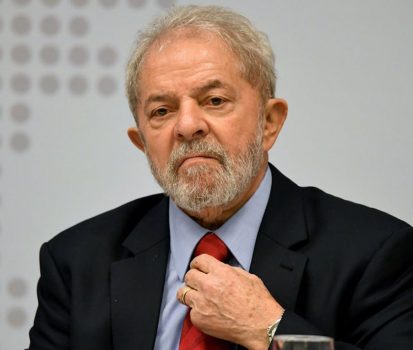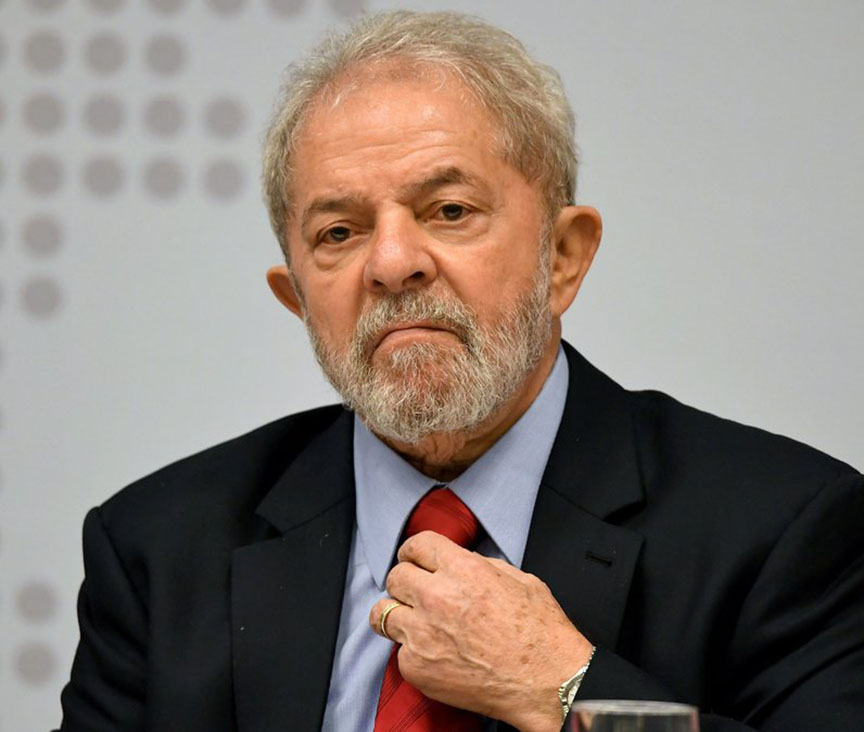SAO PAULO, (Reuters) – A decision looming before Brazil’s Supreme Court could free imprisoned former President Luiz Inacio Lula da Silva within days and deal the harshest blow yet to the South American country’s battle against corruption, prosecutors and judges say.
Several justices on Brazil’s top court have already made clear they want to overturn a landmark 2016 ruling that allowed defendants to be jailed if their graft convictions were upheld on a first appeal – the sole reason that Lula and several senior politicians and businessmen are currently behind bars.
Critics say the decision denies defendants the constitutional right to exhaust the appeals process before being jailed and Supreme Court Justice Marco Aurelio Mello is expected to decide early this week whether to bring before the full tribunal a motion against the ruling.
But leaders of Brazil’s groundbreaking anti-corruption drive, including the crusading Judge Sergio Moro who jailed Lula this month, told Reuters that overturning the decision would seriously damage the country’s sweeping battle against graft.

Reversing the ruling would mean not just freedom for Lula, who leads polls for October’s presidential election, but also the release of many other leading politicians and businessmen serving time for corruption.
Other powerful figures, like President Michel Temer, who face graft trials or are under investigation, would also benefit from the change if eventually found guilty.
The high court’s ruling two years ago “expressed an understanding that impunity and corruption walk hand-in-hand,” Moro said by email. “I have great hope that the Supreme Court will not reverse its precedent.”
Before that 2016 decision, white-collar criminals wealthy enough to afford expert lawyers could launch countless appeals and remain free as their cases crawled through the country’s complex and backlogged legal system.
Moro has spearheaded the fight against graft, convicting over 120 people, including Lula, in the “Car Wash” investigation.
The four-year-old probe centers on construction firms that paid billions in bribes to politicians and former executives of state-run companies in exchange for contracts with state oil company Petroleo Brasileiro SA and other enterprises.
Lula, 72, was sentenced to 10 years in prison last year after he was found guilty of accepting 3.7 million reais ($1.1 million) worth of bribes from engineering firm OAS SA, the amount of money prosecutors said the company spent refurbishing a beach apartment for Lula in return for his help winning contracts with Petroleo Brasileiro, as Petrobras is formally known.
In January, a higher court rejected his appeal and extended his sentence to just over 12 years. Lula, an icon for many on Latin America’s left, finally turned himself in to police on April 7 after a Supreme Court justice rejected his latest petition, throwing Brazil’s presidential race wide open.
“It’s impossible to read the Brazilian Constitution, with its high standards on liberty, equality and democracy, in the sense that it aims to guarantee impunity for the powerful even when their crimes are proven,” Moro said. “We are a republic, after all, not a society of castes.”
Justice Gilmar Mendes, who in 2016 sided with the majority in the narrow 6-5 decision, now says he has reversed his opinion. He argues that the ruling was only meant to give lower courts the possibility of jailing someone after their first appeal, but that in practice it had become mandatory.
Any decision will hinge on Justice Rosa Weber, considered the only swing vote. Two years ago she sided with those who wanted to allow defendants to remain free until they used all their appeals.
She has signaled in recent decisions that her stance may have changed, but she has not made any clear public statement on the matter.
“It would be a harsh blow. We would return to a system that allows impunity and endless delays,” said Rodrigo Janot, who until late last year was Brazil’s prosecutor general and remains an influential senior prosecutor.
Janot told Reuters that removing the threat of prison after a first appeal would destroy the best weapon used against corruption – the plea bargain agreements that were allowed in the passage of a 2013 law to combat organized crime.
“Nobody will want to turn state’s witness if they know they will not face punishment,” Janot said, noting that the corruption in the Car Wash scheme had continued even after several politicians were imprisoned.
“Imagine what will happen if people know they can act criminally and that the most remote thing in the universe is the chance that they would go to prison?”
Top court Justice Luis Roberto Barroso, the most vocal defender of continuing to imprison people after a first failed appeal, said the only reason the subject is back up for debate is because of the graft investigations’ effectiveness.
“The reaction is obvious,” he said at an event in Rio de Janeiro last week. “The changes are hitting people who have always judged themselves as being above the law, and for that reason they thought that the rule of law would never be applied to them.”
Prosecutor General Raquel Dodge last week argued in a brief filed before the top court that it must carefully weigh whether the benefits of repealing the precedent outweigh the costs to the efficacy of the judicial system.
“Any review should be carried out with caution and parsimony, and only when a precedent no longer corresponds to society’s sense of justice,” she wrote.










